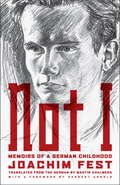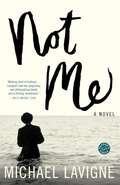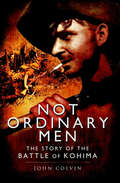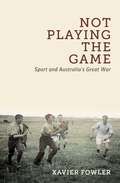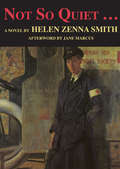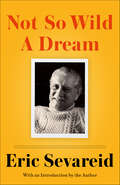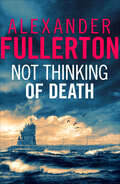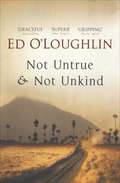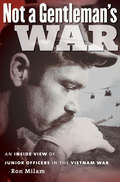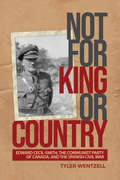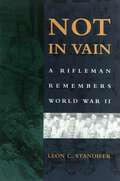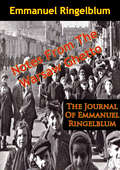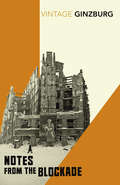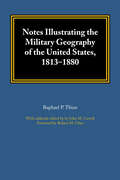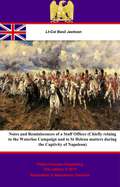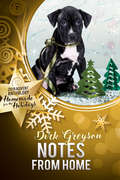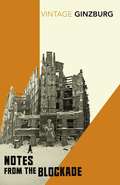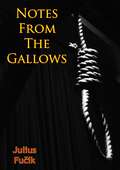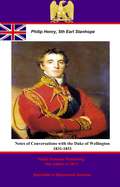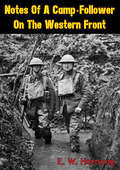- Table View
- List View
Not I: Memoirs of a German Childhood
by Joachim C. FestA portrait of an intellectually rigorous German household opposed to the Nazis and how its members suffered for their political stance<P> Few writers have deepened our understanding of the Third Reich as much as German historian, biographer, journalist, and critic Joachim Fest. His biography of Adolf Hitler has reached millions of readers around the world. Born in 1926, Fest experienced firsthand the rise of the Nazis, the Second World War, and a catastrophically defeated Germany, thus becoming a vital witness to these difficult years. <P> In this memoir of his childhood and youth, Fest offers a far-reaching view of how he experienced the war and National Socialism. True to the German Bildung tradition, Fest grows up immersed in the works of Goethe, Schiller, Mörike, Rilke, Kleist, Mozart, and Beethoven. His father, a conservative Catholic teacher, opposes the Nazi regime and as a result loses his job and status. Fest is forced to move to a boarding school in the countryside that he despises, and in his effort to come to terms with his father’s strong political convictions, he embarks on a tireless quest for knowledge and moral integrity that will shape the rest of his life and writing career.
Not Me
by Michael LavigneNot Me is a remarkable debut novel that tells the dramatic and surprising stories of two men-father and son-through sixty years of uncertain memory, distorted history, and assumed identity. When Heshel Rosenheim, apparently suffering from Alzheimer's disease, hands his son, Michael, a box of moldy old journals, an amazing adventure begins-one that takes the reader from the concentration camps of Poland to an improbable love story during the battle for Palestine, from a cancer ward in New Jersey to a hopeless marriage in San Francisco. The journals, which seem to tell the story of Heshel's life, are so harrowing, so riveting, so passionate, and so perplexing that Michael becomes obsessed with discovering the truth about his father. As Michael struggles to come to grips with his father's elusive past, a world of complex and disturbing possibilities opens up to him-a world in which an accomplice to genocide may have turned into a virtuous Jew and a young man cannot recall murdering the person he loves most; a world in which truth is fiction and fiction is truth and one man's terrible-or triumphant-transformation calls history itself into question. Michael must then solve the biggest riddle of all: Who am I?Intense, vivid, funny, and entirely original, Not Me is an unsparing and unforgettable examination of faith, history, identity, and love.From the Hardcover edition.
Not Me
by Michael LavigneNot Me is a remarkable debut novel that tells the dramatic and surprising stories of two men–father and son–through sixty years of uncertain memory, distorted history, and assumed identity. When Heshel Rosenheim, apparently suffering from Alzheimer’s disease, hands his son, Michael, a box of moldy old journals, an amazing adventure begins–one that takes the reader from the concentration camps of Poland to an improbable love story during the battle for Palestine, from a cancer ward in New Jersey to a h...
Not My Child
by Kitty NealeLondon, 1923. Cyril Black is finally out of prison. Rather than going home to his wife and son, he visits his mistress only to find that she's given birth to his daughter - and wants nothing to do with her. His wife, Florrie, reluctantly agrees to take them in. But there's no love in her heart for another woman's child... 1939. At sixteen, Penny Black lives in constant fear of her mother's temper. Her only friend is her twelve-year-old neighbour, Katy Darwin. When they learn Katy will be evacuated to the countryside, the two come up with a plan to smuggle Penny along. Farm life in Kent is a far cry from Penny's Battersea upbringing... but there's only so long she can live a lie. Will Penny ever find the love and acceptance she's always longed for?The stunning new standalone wartime saga from Sunday Times bestselling author Kitty Neale. Pre-order now!
Not My Child
by Kitty NealeLondon, 1923. Cyril Black is finally out of prison. Rather than going home to his wife and son, he visits his mistress only to find that she's given birth to his daughter - and wants nothing to do with her. His wife, Florrie, reluctantly agrees to take them in. But there's no love in her heart for another woman's child... 1939. At sixteen, Penny Black lives in constant fear of her mother's temper. Her only friend is her twelve-year-old neighbour, Katy Darwin. When they learn Katy will be evacuated to the countryside, the two come up with a plan to smuggle Penny along. Farm life in Kent is a far cry from Penny's Battersea upbringing... but there's only so long she can live a lie. Will Penny ever find the love and acceptance she's always longed for?The stunning new standalone wartime saga from Sunday Times bestselling author Kitty Neale. Pre-order now!
Not My Child
by Kitty NealeLondon, 1923. Cyril Black is finally out of prison. Rather than going home to his wife and son, he visits his mistress only to find that she's given birth to his daughter - and wants nothing to do with her. His wife, Florrie, reluctantly agrees to take them in. But there's no love in her heart for another woman's child... 1939. At sixteen, Penny Black lives in constant fear of her mother's temper. Her only friend is her twelve-year-old neighbour, Katy Darwin. When they learn Katy will be evacuated to the countryside, the two come up with a plan to smuggle Penny along. Farm life in Kent is a far cry from Penny's Battersea upbringing... but there's only so long she can live a lie. Will Penny ever find the love and acceptance she's always longed for?The stunning new standalone wartime saga from Sunday Times bestselling author Kitty Neale. Pre-order now!
Not Ordinary Men: The Story of the Battle of Kohima (Pen And Sword Military Classics Ser. #Vol. 26)
by John ColvinHaving driven the British and Indian Forces out of Burma in 1942, General Mutaguchi, Commanding the 15th Japanese Army, was obsessed by the conquest of India. In 1944 the British 14th Army, under its commander General Slim, drew back to the Imphal Plain, before Mutaguchis impending offensive. To the north, however, the entire Japanese 31 Division had crossed the Chindwin and, on April 5, arrived at the hill-station and road junction of Kohima, cutting off Imphal except by air, from the supply point at Dimpapur.Kohima was initially manned by only 266 men of the Assam Regiment and a few hundred convalescents and administrative troops. They were joined, on April 5, by 440 men of the Fourth Battalion of the Royal West Kent Regiment, straight from the Battle of Arakan.In pouring rain, under continual bombardment, this tiny garrison held the assaults of thirteen thousand Japanese troops in hand-to-hand combat for sixteen days, an action described by Mountbatten as probably one of the greatest battles in history ... in effect the Battle of Burma, naked, unparalleled heroism, the British/Indian Thermopylae.
Not Playing the Game: Sport and Australia's Great War
by Xavier FowlerWar remembrance and sport have become increasingly entwined in Australia, with AFL and NRL Anzac Day fixtures attracting larger crowds than dawn services. National representative teams travel halfway around the world to visit battle sites etched in military folklore. To validate their integration into this culturally sacred occasion, promoters point to the special role of sport in the development of the Anzac legend, and with it, the birth of the nation. The air of sombre reflection that surrounds each Anzac Day is accompanied by a celebratory nationalism that sport and war supposedly embody. But what exactly is being remembered, and indeed forgotten, in these official commemorations and tributes? In Not Playing the Game, Xavier Fowler reveals that the place of sport in the Great War was highly contested. Civilian patriots and public officials complained that spectator sport distracted young men from enlisting and wasted public finances better spent elsewhere. Sport's defenders argued it was a necessary escape for a population weary of the pressures of war. These competing views often reflected differences of class, politics and ethnicity, and resulted in ferocious, sometimes violent, clashes. Not Playing the Game challenges the way our memories of the war are influenced by the fervour of sport, painting a picture not of triumph but immense turmoil and tragedy.
Not So Quiet...: A Novel (Women And Peace Ser.)
by Jane Marcus Helen Zenna SmithThis story offers a rare, funny, bitter, feminist look at war from women actively engaged in it. Published in London in 1930, Not So Quiet...(on the Western Front) is a novel in autobiographical guise that describes a group of British women ambulance drivers on the French front lines during World War 1. As Voluntary Aid Detachment workers, the women pay for the privilege of driving the wounded through shell fire in the freezing cold, on no sleep and an inedible diet, under the watchful eye of their punishing commandant, nicknamed Mrs. Bitch.
Not So Wild A Dream
by Eric Sevareid"For anyone even remotely interested in American literature and journalism, Not So Wild a Dream is a must-read, and a joy."– Dan RatherIn this captivating first-person account, Eric Sevareid describes in thrilling detail his time as a journalist covering international affairs during World War II. From a young man in North Dakota to an instrumental figure in establishing CBS as an international news organization, Sevareid witnessed the shaping of America’s journalistic landscape. His experiences provide an invaluable glimpse into the trials and tribulations of a dogged reporter. With current distrust of the press on the rise, Sevareid’s insight is poignant and all the more necessary."The book is an excellent sketch of the war's progress, and a thoughtful personal record of Mr. Sevareid's adventures--one of the most far ranging war correspondent journals yet published."– Library Journal
Not Thinking Of Death
by Alexander FullertonWorld War Two is almost upon them. But first the submariners must face another danger…As the shadow of Nazism descends on Europe, Britain at last begins to prepare her defences. Trials start for a new class of submarine in the mouth of the Clyde.Royal Navy submariner Rufus Chalk, on board as an observer, has misgivings. There are technical problems, small enough in themselves but together possibly dangerous.On this first dive in the open sea, with numerous observers on board, if there were an accident the precious air supply would last only half as long as normal…Written by acclaimed naval veteran Alexander Fullerton and based loosely on the tragic loss of H.M. Submarine Thetis in Liverpool Bay in 1939, Not Thinking Of Death is an unputdownable novel, perfect for fans of Anthony Trew, Alan Evans and Max Hennessy.Praise for Alexander Fullerton‘The scene of battle is quite overpowering’ Sunday Times‘His action passages are superb, and he never puts a period foot wrong’ Observer ‘What le Carré is to the spy genre, Fullerton is to naval warfare’ South Wales Echo
Not Untrue & Not Unkind: A Novel
by Ed O'LoughlinA Man Booker Prize–nominated novel that &“vividly re-creates the life of a foreign correspondent&” (Booklist). Owen Simmons is working an easy gig at a Dublin newspaper, having left behind the life of war reporting. Then he finds an old photo, taken in Africa in the era of the Rwandan genocide. It will transport him into a wave of intense memories of dead bodies, orphans, the ravages of wartime epidemics—as well as a woman he once loved, and a shattering event in his past. From an author who covered Africa for the Irish Times, this is a &“gripping&” novel of friendship, rivalry, and betrayal among a group of journalists and photographers in the thick of danger and far from home (Daily Mail). &“This atmospheric book authentically carries the sounds and flavors of a Graham Greene novel, reading at times like a memoir with the seamless underbelly of a gritty Hemingwayesque tale.&” —New York Journal of Books &“A fine, darkly authoritative novel.&” —Joseph O&’Neill, author of Netherland &“A book that far transcends the usual literary efforts of the former combat reporter. It stands as an elegy not only for Simmons&’s band of colleagues but for a golden era of journalism.&” —The New York Times Book Review
Not a Gentleman's War: An Inside View of Junior Officers in the Vietnam War
by Ron MilamWars are not fought by politicians and generals--they are fought by soldiers. Written by a combat veteran of the Vietnam War,Not a Gentleman's Waris about such soldiers--a gritty, against-the-grain defense of the much-maligned junior officer. Conventional wisdom holds that the junior officer in Vietnam was a no-talent, poorly trained, unmotivated soldier typified by Lt. William Calley of My Lai infamy. Drawing on oral histories, after-action reports, diaries, letters, and other archival sources, Ron Milam debunks this view, demonstrating that most of the lieutenants who served in combat performed their duties well and effectively, serving with great skill, dedication, and commitment to the men they led. Milam's narrative provides a vivid, on-the-ground portrait of what the platoon leader faced: training his men, keeping racial tensions at bay, and preventing alcohol and drug abuse, all in a war without fronts. Yet despite these obstacles, junior officers performed admirably, as documented by field reports and evaluations of their superior officers. More than 5,000 junior officers died in Vietnam; all of them had volunteered to lead men in battle. Based on meticulous and wide-ranging research, this book provides a much-needed serious treatment of these men--the only such study in print--shedding new light on the longest war in American history.
Not a Good Day to Die: The Untold Story of Operation Anaconda
by Sean NaylorAward-winning combat reporter Sean Naylor reveals how close American forces came to disaster in Afghanistan against Al Qaida--after easily defeating the ragtag Taliban that had sheltered the terrorist organization behind the 9/11 attacks.At dawn on March 2, 2002, over two hundred soldiers of the 101st Airborne and 10th Mountain Divisions flew into the mouth of a buzz saw in Afghanistan's Shahikot Valley. Believing the war all but over, U.S. military leaders refused to commit the extra infantry, artillery, and attack helicopters required to fight the war's biggest battle-- a missed opportunity to crush hundreds of Al Qaida's fighters and some of its most senior leaders. Eyewitness Naylor vividly portrays the heroism of the young, untested soldiers, the fanaticism of their ferocious enemy, the mistakes that led to a hellish mountaintop firefight, and how thirteen American commandos embodied "Patton's three principles of war"--audacity, audacity, and audacity--by creeping unseen over frozen mountains into the heart of an enemy stronghold to prevent a U.S. military catastrophe.
Not for King or Country: Edward Cecil-Smith, the Communist Party of Canada, and the Spanish Civil War (G - Reference, Information And Interdisciplinary Subjects Ser.)
by Tyler WentzellNot for King or Country tells the story of Edward Cecil-Smith, a dynamic propagandist for the Communist Party of Canada during the Great Depression. Born to missionary parents in China in 1903, Cecil-Smith came to Toronto in 1919 where he joined the Canadian militia and lived a happy life ensconced in the Protestant missionary community of Toronto. He became increasingly interested in radical politics during the 1920s, eventually joining the Communist Party in 1931. Worried by the growing strength of fascism around the world, particularly in China, Germany, Italy, and Spain during the summer of 1936, Cecil-Smith quietly departed Canada and became among the first volunteers to fight for the Republic in the Spanish Civil War. Cecil-Smith was motivated to fight not out of any sense of traditional patriotism (“for king or country”) but out of a sense that the onward march of fascism had to be stopped, and Spain was where the line had to be drawn. Not for King or Country is the first biography of a Canadian commander in the Spanish Civil War, and is also the first book to critically analyse the major battles in which the Canadian and American volunteers fought. Drawing upon declassified RCMP files, records held in the Russian Archives in Moscow, audio recordings of the volunteers, a detailed survey of maps, and battle records, as well as and the Communist Party press, Not for King or Country breaks down the battles and the Party's activities in a way that will be accessible to interested readers and scholars alike.
Not in Vain: A Rifleman Remembers World War II
by Leon C. StandiferGrowing up in a small college town in central Mississippi in the 1930s, Leon C. Standifer knew little of the trauma of war. But by the time he was nineteen, World War II had made war a reality for him. Standifer volunteered for and was accepted by a special army program that would send him to college for technical training; he sometimes hoped and some-times feared that the war would end before the training did. Events turned out quite otherwise. A serious shortage of trained riflemen needed for the invasion of Normandy meant that Standifer and more than one hundred thousand other young men were taken from the program and sent into battle as combat infantrymen. Not in Vain: A Rifleman Remembers World War II looks at American involvement in the war from the firsthand perspective of this nineteen-year-old soldier. As an infantryman in France and Germany during the latter part of the war, Standifer experienced the numbing boredom of daily routine and the adrenaline-pumping excitement of combat. He re-calls the anguish of losing friends in battle and the decisive moment when he slit the throat of an enemy soldier, memories that haunt him still. But Not in Vain is far more than a conventional soldier’s memoir. Although he recounts in vivid detail his personal experiences, Standifer also makes a far broader inquiry into the forces that turned a sheltered young man from a religious, small-town back-ground into an effective soldier. Growing up in the Baptist church, Standifer thought he had learned the differences between good and evil, right and wrong. But after his days in battle, moral distinctions were no longer as clear.Not in Vain documents Standifer’s lifelong debate with himself over the justification for war by considering not only his reactions during combat but also the feelings that have remained with him for life. He describes these intense emotions in his account of a trip taken to Europe many years after the war and of his recent reunion with some of the former members of his rifle company. Written in an effort to come to terms with his involvement in the war, Not in Vain is a probing and timely study of a citizen’s dedication to his country.
Notes From The Warsaw Ghetto: The Journal Of Emmanuel Ringelblum
by Emmanuel RingelblumWhen the walls of the Warsaw Ghetto first went up in November 1940, Emmanuel Ringelblum was there. In the face of horrendous persecution and palpable danger, his goal was to create a written record of life in the Ghetto, not just the destitution and brutality of life under Nazi rule, but out of the shining acts of nobility and heroism by people under the most dire circumstances.From Inside the Ghetto, Ringelblum, a well-respected historian and archivist, compiled his journal recording daily life in the Ghetto, from its beginnings to the eve of the Ghetto uprising in April 1943. Using accounts and anecdotes from his many friends and neighbours, Ringelblum created a detailed, colourful, and emotional record of one of the most terrible epochs in human history.Notes from the Warsaw Ghetto is an unflinching, first-hand account of history unfolding before your very eyes.
Notes From the Blockade
by Lydia GinzburgThe 900-day siege of Leningrad (1941-44) was one of the turning points of the Second World War. It slowed down the German advance into Russia and became a national symbol of survival and resistance. An estimated one million civilians died, most of them from cold and starvation. Lydia Ginzburg, a respected literary scholar (who meanwhile wrote prose 'for the desk drawer' through seven decades of Soviet rule), survived. Using her own using notes and sketches she wrote during the siege, along with conversations and impressions collected over the years, she distilled the collective experience of life under siege. Through painful depiction of the harrowing conditions of that period, Ginzburg created a paean to the dignity, vitality and resilience of the human spirit.This original translation by Alan Myers has been revised and annotated by Emily van Buskirk. This edition includes ‘A Story of Pity and Cruelty’, a recently discovered documentary narrative translated into English for the first time by Angela Livingstone.
Notes Illustrating the Military Geography of the United States, 1813–1880
by Raphael P. ThianWhen the Adjutant General's Office published Raphael Thian's "notes" on U.S. military geography in 1880, it produced an invaluable research tool for generations of military historians to come. In this single documented reference volume, Chief Clerk Thian traced the confusing mutations through which the divisions, departments, and districts of the Army's command had evolved since 1813. The volume is divided into three parts, beginning with the names of the United States Army Continental Commands, the date and authority for their creation, location of the headquarters, geographical changes and discontinuances, and other details including the geographical boundaries embracing each division, department, and district. Part II is filled with background information on states and territories, and Part III lists the maps contained in The Military Atlas of the United States. The Addenda to this edition expand and update Thian's work. Notes made by Francis B. Heitman to keep his personal copy current are included, as is the Memorandum published by the government in 1906. This addition lists all changes from 1898 through 1905.
Notes and Reminiscences of a Staff Officer: Chiefly relating to the Waterloo Campaign and to St Helena matters during the captivity of Napoleon
by Pickle Partners Publishing Lt.-Colonel Basil Jackson Robert Cooper SeatonThis ebook is purpose built and is proof-read and re-type set from the original to provide an outstanding experience of reflowing text for an ebook reader. Although written many years after the events, Lt-Col Jackson's writing makes for much interesting reading. The text falls into three distinct parts; the first, the events of the Waterloo Campaign, the second, Jackson's experiences on St. Helena and his interactions with Napoleon's staff and his meeting of the Great Captain and thirdly his view of the works published or purportedly published about St Helena. The eyewitness account of a young staff officer on the Quartermaster-General's staff at Waterloo, whilst containing some errors perhaps due to memory lapses, makes for excellent reading and is an important memoir of that momentous campaign. His praise of the Duke of Wellington's actions during the battle itself are tempered with some criticism of his handling of the campaign as a whole, particularly his reaction to Napoleon's advance. Although avoiding the Anglocentric view of the critical Prussian intervention at Planchenoit, doesn't hesitate to condemn their pillage and attempts to make off with cannon captured by the Anglo-Dutch army. Following the occupation of Paris, during which he takes part in a number of dangerous incidents with a surly and angry populace, Jackson is ordered to St Helena as a part of the staff organisation. His interactions with Gourgaud, Montholon, Las Cases and Bertrand are of capital interest, and his estimation of Napoleon's character. During his brief interview with the prisoner himself, Napoleon "... alluding to two or three block-houses then in course of erection at the island, asked what Emmett expected to attack them, "est-ce les rais et les souris?" [is it the rays of the sun and the mice?] we were then dismissed." Jackson also defends his former chief, Sir Hudson Lowe against various slanderous attacks for his role as Governor of St Helena, for the majority of Napoleon's imprisonment. An interesting read. Text taken from 1903 edition, full and complete, published by John Murray, London Author - Basil Jackson [1795-1889] Editor - Robert Cooper Seaton [1853-1915] Annotations - Pickle Partners Publishing
Notes from Home (2019 Advent Calendar | Homemade for the Holidays #18)
by Dirk GreysonWhile deployed on a covert mercenary assignment, Johnny doesn’t have much in the way of holiday cheer. But the mysterious notes from Dex that somehow appear in his bunk—reminding him of the gifts, cookies, celebrations, and most of all, love, waiting for him back in Wisconsin—help him get through the long, hot days. Will they be enough to keep his spirits up when the rest of his unit goes home to their families and he’s left alone?A story from the Dreamspinner Press 2019 Advent Calendar "Homemade for the Holidays."
Notes from the Blockade
by Lydia GinzburgThe 900-day siege of Leningrad (1941-44) was one of the turning points of the Second World War. It slowed down the German advance into Russia and became a national symbol of survival and resistance. An estimated one million civilians died, most of them from cold and starvation. Lydia Ginzburg, a respected literary scholar (who meanwhile wrote prose 'for the desk drawer' through seven decades of Soviet rule), survived. Using her own using notes and sketches she wrote during the siege, along with conversations and impressions collected over the years, she distilled the collective experience of life under siege. Through painful depiction of the harrowing conditions of that period, Ginzburg created a paean to the dignity, vitality and resilience of the human spirit. This original translation by Alan Myers has been revised and annotated by Emily van Buskirk. This edition includes 'A Story of Pity and Cruelty', a recently discovered documentary narrative translated into English for the first time by Angela Livingstone.
Notes from the Gallows
by Julius Fucik Samuel SillenOn 24 April 1942, Czechoslovak journalist and active CPC member Julius Fucik was detained in Pankrác Prison in Prague, where he was subsequently interrogated and tortured, before being sent to Germany to stand trial for high treason.It was during this time that Fucik’s Notes from the Gallows (Czech: Reportáž psaná na oprátce, literally Reports Written Under the Noose) arose—written on pieces of cigarette paper and smuggled out by two sympathetic prison warders named Kolinsky and Hora.The notes were treated as great literary works after his death in 1943 and translated into many languages worldwide, resulting in this book, which was first published in English in 1948. It describes events in the prison since Fucik’s arrest and is filled with hope for a better, Communist future.
Notes of Conversations with the Duke of Wellington 1831-1851
by Pickle Partners Publishing Philip Henry, 5th Earl of StanhopeThis ebook is purpose built and is proof-read and re-type set from the original to provide an outstanding experience of reflowing text for an ebook reader. The notes that the 5th Earl Stanhope collected during his intimate friendship with the 1st Duke of Wellington, form an interesting and entertaining addition to the publications of the period and in particular the character and thoughts of the Duke himself. They are chronologically organised, in almost diarised format, and are clearly contemporaneous, Stanhope avoids adding much input of his own to the text, leaving the Duke words to be recorded verbatim. Although published after the Duke's death they are scrupulously cross-referenced with other publications such as the Croker Papers and the Greville memoirs which lends authenticity to the work. There is also a uniformity of character and phrase in the words that Wellington is quoted as saying, so as to lose none of their wit, verve, conservatism and in many cases severity of judgement. Stanhope, himself was no mean scholar, and a champion for the arts being a driving force behind the National Gallery in London. The text contains many insights into how Wellington viewed the world, his allies, and enemies, both political and on the field of battle. The anecdotes feature no less persons than the arch-schemer Prince Talleyrand, Prince Metternich, Field Marshal Blücher, Generals Gneisenau, Picton and Alava, the Royal families of Great Britain and France, Austria, Sir Robert Peel, Lord Castelreagh et al. Of particular interest are his views on the campaigns that made him famous and particularly of Napoleon; just to quote one example of the text 'I have heard, Sir, from military men that Napoleon's campaign to defend Paris was one of his most skilful?--"Excellent--quite excellent. The study of it has given me a greater idea of his genius than any other. Had he continued that system a little while longer, it is my opinion that he would have saved Paris. But he wanted patience--he did not see the necessity of adhering to defensive warfare.' Highly recommended The text, complete and unedited, of this edition is taken from the 1888 edition published by John Murray, London. Author - Philip Henry, 5th Earl Stanhope (30 January 1805 - 24 December 1875)
Notes of a Camp-Follower on the Western Front [Illustrated Edition]
by E. W. HornungIncludes the First World War Illustrations Pack - 73 battle plans and diagrams and 198 photosE. W. Hornung was a noted English author who wrote around the turn of the Twentieth Century, his most famous creation being the Gentleman Thief, Raffles. During the later years of the First World War (1917-1918), the author visited the military camps of the British army. He was particularly struck by the character of the soldiers in their moments of brief repose out of the firing line and decided to write a semi-fictionalized account of the camps. This volume 'Notes of a Camp-Follower on the Western Front' is that account; gripping, emotive and lucid, Hornung's clear style and vivid eye of detail recreates the British troops that fought in Flanders Fields.
